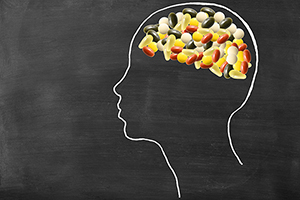In the 60s, Grace Slick of Jefferson Airplane memorialized the expression “Feed Your Head!” And now, a half-century later, it’s come to full realization with the advent of scientifically-validated “brain nutrition”! Check out this article from our friends at Klaire Labs for more on three key nutrients to support your brain health.
—Dr. Hoffman
(This article contains content provided by one of our trusted sponsors.)
The brain makes up only two percent of a person’s body weight, yet it consumes roughly 20 percent of the body’s energy when at rest. Many nutrients have been shown to support optimal neurologic and cognitive function. In addition to the well-known omega-3 fatty acid DHA, other nutrients have demonstrated efficacy in supporting cognitive function. Here are snapshots of three:
Phosphatidylserine
Phosphatidylserine (PS) is a phospholipid that occurs naturally in the body. Although it is less abundant in the body than other phospholipids (like phosphatidylcholine), it has critical functions in several biological areas, such as blood clotting, cellular turnover, and cell-to-cell communication.[1] As with other phospholipids, PS is a critical component in the structure of cell membranes, particularly nerve cells in the brain.[2]
Phospholipids move within the fluid mosaic of cell membranes. As the major phospholipid in the brain, PS is able to cross the blood-brain barrier, making it directly active in the brain after oral supplementation.[3] Once in the brain, PS exerts a beneficial influence over brain structures and systems, including neurotransmitters like serotonin and dopamine.*[4] [5] [6]
Several clinical trials have shown that PS supplementation supports cognitive function.* In one controlled trial, thirty six children, aged 4-14 years, who were experiencing attention-related issues were given 200 mg/d of PS or placebo for two months.[7] PS supplementation resulted in significant improvements in attention, impulsive movement, and short-term auditory memory as compared with placebo. PS was well-tolerated and showed no adverse effects.
Phosphatidylserine has further been shown to support healthy endocrine and adrenal responses to mental stress.* In a double-blind study, PS (400 mg, 600 mg or 800 mg/d) was administered to healthy women and men 20 to 45 years old.[8] In the groups receiving 400 mg/d of PS only, researchers observed a beneficial modulation of stress and stress hormones. There was also a positive effect on emotional responses at 400 mg/d. The researchers thought that the activity of PS had to do with modulating the communication axis between the hypothalamus, pituitary, and adrenal glands, which coordinate to regulate stress in the body.*
Phosphatidylserine also supports cognitive function in aging individuals.* In a clinical trial, 70 elderly subjects with cognition complaints experienced transient improvement of cognitive and memory function, as well as improvements in electrical measurements of brain function.[9]*
Acetyl L-Carnitine
Acetyl L-Carnitine (ALC) is needed in the body for the transport of fatty acids. It is derived from the amino acid L-carnitine, and has been shown to support healthy cognitive function, concentration and focus, enhance nerve cell function, regenerate peripheral nerve cells, provide antioxidant protection, and promote cellular energy production.* It also plays a major role in the healthy functioning of mitochondria, the cell organelles responsible for energy production.*[10] Acetyl L-carnitine supports cardiovascular health by providing antioxidant protection and promoting cellular energy production, and has been shown to support the reproductive system.* [11] [12]
Like phosphatidylserine, acetyl-L-carnitine is able to cross the blood-brain barrier.*[13],[14] Although its precise mechanisms of action are unknown, research suggests it benefits nerve cell transmission and energy metabolism.*[15] Animal research suggests a protective effect of ALC on aging neurons,[16] and that this effect might be due in part its antioxidant activity.*[17]
Most importantly, several clinical trials have demonstrated that ALC supplementation preserves and improves overall cognitive function in the elderly. In a controlled clinical trial, ALC was given to elderly individuals with mild cognitive complaints.[18] After 45 days of supplementation at 1,500 mg/d, significant improvements in cognitive function (especially memory) were observed. Another large clinical trial of ALC in a similar group of elderly individuals found that 1,500 mg/d for 90 days significantly improved memory, mood, and responses to stress.[19] The favorable effects lasted at least a month after treatment was discontinued. Other controlled and open-label clinical trials have corroborated these findings. [20] [21] [22] [23]
Citicoline
Citicoline (also known as CDP-choline) a compound that occurs in the body as it makes phosphatidylcholine.[24]–[25] [26] [27] [28] Citicoline protects cell membranes by improving the presence and activity of other phospholipids.* It has been shown in preclinical and clinical research to support cerebrovascular health.* Like PS and ALC, citicoline crosses the blood-brain barrier and, in addition to its role in supporting synthesis of phospholipids, supports sphingomyelin, a component of the sheath the encases nerve cell axons.[29] Citicoline also increases neurotransmitters such as norepinephrine, acetylcholine, and dopamine in the brain and central nervous system.*[30] Because of these effects, citicoline has also been used to support motor functions of the nervous system that control voluntary and involuntary movements.*[31]–[32] [33] [34]
Initially introduced to support brain circulation and recovery, citicoline is marketed as a prescription drug in Japan, Spain, France and Italy and as a dietary supplement in USA.[35]* A great many studies have documented its activity in the body, its absorption and metabolism, and its safety; Citicoline has virtually no known side effects.[36]
In the years since its introduction, citicoline has been the subject of numerous clinical trials and reviews. In human trials, citicoline is perhaps best known to support cognitive function in susceptible elderly individuals with normal brain circulatory function.*[37] It is understood in part to accomplish this by increasing energy reserves and utilization, as well as increasing the amount of essential phospholipid membrane components needed to make and maintain neurons.*[38] As a dietary supplement, citicoline appears useful for supporting the structural integrity and functionality of the nerve cells in the brain.*[39]
Citicoline has been studied in tens of thousands of subjects and has demonstrated beneficial effects in brain blood flow,[40] recovery from brain trauma,[41],[42] promoting oxygen supply to brain tissue, cognition and motor function, learning and memory, intake of substances of abuse, and visual acuity.[43][44][45][46][47][48]–[49] Citicoline has proven to be a valid approach to nutritional supplementation by individuals with memory problems stemming from cerebrovascular function.[50] An analysis of the available clinical studies performed with this compound confirmed that citicoline restores cell lipid structures and some neurotransmitter functions.* Another analysis found positive effect on memory and behavior in at least the short to medium term (2-3 months). Authors concluded that citicoline supplementation improved cognitive function and protected cell membranes by accelerating phospholipid synthesis, and reducing brain cellular stresses.* [51]
Citicoline is among the best-studied nutrients for supporting memory function and healthy cognition.* It provides the precursors for synthesis of phosphatidylcholine, a major component of cellular membranes in brain tissue.* It enhances communication between brain nerve to support visual function, helps protect brain structures from oxidation and free radicals, supports brain performance by enhancing metabolism and healthy brain activity, assists in sustaining healthy mitochondria in the brain, supports healthy brain metabolism by nourishing and maintaining brain cell phospholipids, and helps maintain normal levels of neurotransmitters that regulate memory, cognitive function, motor activity and brain blood flow.*
[1] Vance JE. Phosphatidylserine and phosphatidylethanolamine in mammalian cells: two metabolically related aminophospholipids. J Lipid Res. 2008 Jul;49(7):1377–87. Epub 2008 Jan 19.
[2] Kim HY, Huang BX, Spector AA. Phosphatidylserine in the brain: metabolism and function.
Prog Lipid Res. 2014 Oct;56:1-18.
[3] Toffano G, Battistella A, Orlando P: Pharmacokinetics of radiolabelled brain phosphatidylserine. Clin Trials J 1987;24:18-24.
[4] Calderini G, Aporti F, Bellini F, et al. Pharmacological effect of phosphatidylserine on age-dependent memory dysfunction. Ann NY Acad Sci 1985;444:504–06.
[5] Argentiero V, Tavolato B: Dopamine (DA) and serotonin metabolic levels in the cerebrospinal fluid (CSF) in Alzheimer’s presenile dementia under basic conditions and after stimulation with cerebral cortex phospholipids (BC-PL). J NeuroI 1980;224:53–58.
[6] Toffano G, Aporti F, Battistella A, et al. Experimental evidences supporting the use of phosphatidylserine Iiposomes in aging brain; in Cecchini A, Nappi G, Arrigo A (eds): Cerebral Pathology in Old Age: Neuroradiological and Neurophysiological Correlations. Pavia, Emiras, 1983, pp 321–33.
[7] Hirayama S, Terasawa K, Rabeler R, et al. The effect of phosphatidylserine administration on memory and symptoms of attention-deficit hyperactivity disorder: a randomised, double-blind, placebo-controlled clinical trial. J Hum Nutr Diet. 2014 Apr;27 Suppl 2:284-91.
[8] Hellhammer J, Fries E, Buss C, Engert V, Tuch A, Rutenberg D, Hellhammer D. Effects of soy lecithin phosphatidic acid and phosphatidylserine complex (PAS) on the endocrine and psychological responses to mental stress. Stress. 2004 Jun;7(2):119–26.
[9] Heiss WD, Kessler J, Mielke R, Szelies B, Herholz K. Long-term effects of phosphatidylserine, pyritinol, and cognitive training in Alzheimer’s disease. A neuropsychological, EEG, and PET investigation. Dementia. 1994 Mar-Apr;5(2):88–98.
[10] Hendler SS, Rorvik, D., eds. Acetyl-L-Carnitine. In: PDR® for Nutritional Supplements. 2nd ed. Montvale, NJ: Physician’s Desk Reference Inc; 2008:13-6.
[11] Bremer, J. The role of carnitine in intracellular metabolism. J Clin Chem Clin Biochem 1990;28:297–301.
[12] Goa KL, Brogden A. L-carnitine a preliminary review of its pharmacokinetics, and its therapeutic use in ischaemic cardiac disease and primary and secondary carnitine deficiencies in relationship to its role in fatty acid metabolism. Drugs 1987;34:1–24.
[13] Kidd PM. Neurodegeneration from mitochondrial insufficiency: nutrients, stem cells, growth factors, and prospects for brain rebuilding using integrative management. Altern Med Rev 2005;10:268-93.
[14] Parnetti L, Gaiti A, Mecocci P, et al. Pharmacokinetics of IV and oral acetyl-L-carnitine in a multiple dose regimen in patients with senile dementia of Alzheimers type. Eur J Clin Pharmacol 1992;72:89-93.
[15] Monograph. Acetyl-L-carnitine. Altern Med Rev 1999;4:438-41.
[16] Napoleone P, Ferrante F, Ghirardi O, Ramacci MT, Amenta F. Age-dependent nerve cell loss in the brain of Sprague-Dawley rats: effect of long term acetyl-L-carnitine treatment. Arch Gerontol Geriatr 1990;10:173-85.
[17] Zanelli SA, Solenski NJ, Rosenthal RE, Fiskum G. Mechanisms of ischemic neuroprotection by acetl-L-carnitine. Ann N Y Acad Sci 2005;1053:153-61.
[18] Cipolli C, Chiari G. [Effects of L-acetylcarnitine on mental deterioration in the aged: initial results.] Clin Ter 1990;132(6 Suppl):479-510 [in Italian].
[19] Salvioli G, Neri M. L-acetylcarnitine treatment of mental decline in the elderly. Drugs Exp Clin Res 1994;20:169-76.
[20] Garzya G, Corallo D, Fiore A, et al. Evaluation of the effects of L-acetylcarnitine on senile patients suffering from depression. Drugs Exp Clin Res 1990;16:101-6.
[21] Genazzani E. [A controlled clinical study on the efficacy of L-acetylcarnitine in the treatment of mild to moderate mental deterioration in the aged. Conclusions.] Clin Ter 1990;132(6 Suppl):511-2.
[22] Bonavita E. Study of the efficacy and tolerability of L-acetylcarnitine therapy in the senile brain. Int J Clin Pharmacol Ther Toxicol 1986;24:511-6.
[23] Passeri M, Iannuccelli M, Ciotti G, et al. Mental impairment in aging: selection of patients, methods of evaluation and therapeutic possibilities of acetyl-L-carnitine. Int J Clin Pharmacol Res 1988;8(5):367-76.
[24] Babb SM, Wald LL, Cohen BM, et al. Chronic citicoline increases phosphodiesters in the brains of healthy older subjects: an in vivo phosphorus magnetic resonance spectroscopy study. Psychopharmacology (Berl). 2002;161: 248-54.
[25] Rao AM, Hatcher JF, Dempsey RJ. Lipid alterations in transient forebrain ischemia: possible new mechanisms of CDP-choline neuroprotection. J Neurochem. 2000;75(6):2528-35.
[26] Wurtman RJ Regan M, Ulus I, Yu L. Effect of oral CDP-choline on plasma choline and uridine levels in humans. Biochem Pharmacol. 2000; 60(7):989-92.
[27] Rao AM, Hatcher JF, Dempsey RJ. CDP-choline: neuroprotection in transient forebrain ischemia of gerbils. J Neurosci Res. 1999; 58(5):697-705.
[28] López-Coviella I, Agut J, Savci V, Ortiz JA, Wurtman RJ. Evidence that 5′-cytidinediphosphocholine can affect brain phospholipid composition by increasing choline and cytidine plasma levels. J Neurochem. 1995; 65(2):889-94.
[29] Rao AM, Hatcher JF, Dempsey RJ. (2000). Lipid alterations in transient forebrain ischemia: possible new mechanisms of CDP-choline neuroprotection. J Neurochem. 2002;75(6):2528-35.
[30] Secades JJ, Lorenzo JL. Citicoline: pharmacological and clinical review, 2006 update. Methods Find Exp Clin Pharmacol. 2006; 27 (Suppl B):1-56. [Review]
[31] Ruggieri S, Zamponi A, Casacchia M, Agnoli A. [Therapeutic effects of cyticholine (cytidine-diphospho-choline) in Parkinsonian syndrome]. Clin Ter. 1976 Sep 30;78(6):515-25. [Article in Italian]
[32] Cubells JM, Hernando C. Clinical trial on the use of cytidine diphosphate choline in Parkinson’s disease. Clin Ther. 1988;10(6):664-71.
[33] Martí Massó JF, Urtasun M. Citicoline in the treatment of Parkinson’s disease. Clin Ther. 1991 Mar-Apr;13(2):239-42.
[34] Eberhardt R, Birbamer G, Gerstenbrand F, Rainer E, Traegner H. Citicoline in the treatment of Parkinson’s disease. Clin Ther. 1990 Nov-Dec;12(6):489-95.
[35] Alexandrov AV. Citicoline: Ferrer Internacional. Curr Opin Invest Drugs. 2001;2:1757–1762.
[36] [No author listed]. Cytidine diphosphate choline (citicoline, Somazina) Arzneim-Forsch. 1983;33:1011–1080.
[37] Cacabelos R, Caamano J, Gomez MJ, Fernandez-Novoa L, Franco-Maside A, Alvarez XA. Therapeutic effects of CDP-choline in Alzheimer’s disease. Cognition, brain mapping, cerebrovascular hemodynamics, and immune factors. Ann NY Acad Sci. 1996;777:399–403.
[38] Silveri MM, Dikan J, Ross AJ, et al. Citicoline enhances frontal lobe bioenergetics as measured by phosphorus magnetic resonance spectroscopy. NMR Biomed. 2008; 21(10):1066-75.
[39] Conant R, Schauss AG. Therapeutic applications of citicoline for stroke and cognitive dysfunction in the elderly: a review of the literature. Altern Med Rev. 2004; 9:1, 17-31.
[40] Adibhatla RM, Hatcher JF . Cytidine 5′-diphosphocholine (CDP-choline) in stroke and other CNS disorders. Neurochem Res. 2005 Jan;30(1):15-23.
[41] Adibhatla RM, Hatcher JF, Dempsey RJ. Citicoline: Neuroprotective mechanisms in cerebral ischemia. J Neurochem. 2002;80:12–23.
[42] Adibhatla RM, Hatcher JF. Citicoline mechanisms and clinical efficacy in cerebral ischemia. J Neurosci Res. 2002;70:133–139.
[43] Grieb P, Rejdak R. Pharmacodynamics of citicoline relevant to the treatment of glaucoma. J Neurosci Res. 2002;67:143–148.
[44] Adibhatla RM, Hatcher JF. Citicoline mechanisms and clinical efficacy in cerebral ischemia. J Neurosci Res. 2002;70(2):133-9.
[45] Agnoli A, Bruno G, Fioravanti M, et al. Therapeutic approach to senile memory impairment: a double-blind clinical trial with CDP choline. Alzheimer’s Disease: Proceedings of the Fifth Meeting of the International Study Group on the Pharmacology of Memory Disorders Associated with Aging. Boston: Birkhauser, 1989: 649-54.
[46] Spiers PA, Myers D, Hochanadel GS, Lieberman HR, Wurtman RJ. Citicoline improves verbal memory in aging. Arch Neurol. 1996; 53: 441-8.
[47] Caamano J, Gomez MJ, Franco A, Cacabelos R. (1994). Effects of CDP-choline on cognition and cerebral hemodynamics in patients with Alzheimer’s disease. Methods Find Exp Clin Pharmacol. 1994;16:211-8.
[48] Alvarez XA, Mouzo R, Pichel V, et al. Double-blind placebo-controlled study with citicoline in APOE genotyped Alzheimer’s disease patients. Effects on cognitive performance, brain bioelectrical activity and cerebral perfusion. Methods Find Exp Clin Pharmacol. 1999;21:633-44.
[49] Clark WM, Wechsler LR, Sabounjian LA, Schwiderski UE. A phase III randomized efficacy trial of 2000 mg citicoline in acute ischemic stroke patients. Neurology. 2001;57:1595-1602.
[50] Fioravanti M, Buckley AE. Citicoline (Cognizin) in the treatment of cognitive impairment.
Clin Interv Aging. 2006;1(3):247-51.
[51] Fioravanti M, Yanagi M. Cytidinediphosphocholine (CDP-choline) for cognitive and behavioural disturbances associated with chronic cerebral disorders in the elderly. Cochrane Database Syst Rev. 2005;CD000269.







